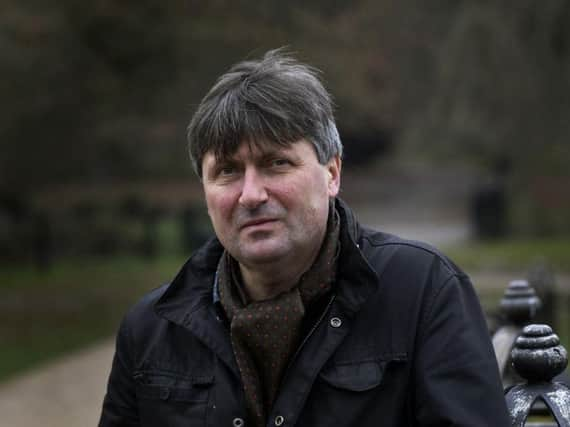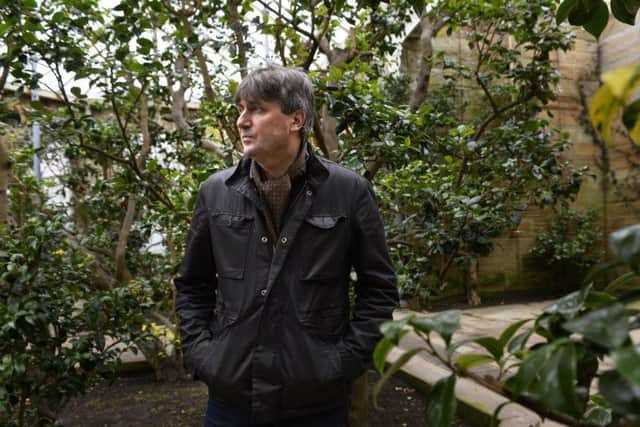Simon Armitage on being Poet Laureate, climate change and raising the profile of our libraries


He has written eight commissioned poems on a range of subjects including Finishing It for Cancer Research, recognising the on-going progress in drug-based treatments of the disease; Fugitives, a celebration of the 70th anniversary of the National Parks and Access to the Countryside Act which led to the creation of the UK’s 46 Areas of Outstanding Natural Beauty; Conquistadors which highlighted 50 years since the first Moon landing from Apollo 11 on July 20, 1969; and the very moving All Right?, commissioned by Northern rail, the Samaritans and Mind in which a short interaction between two strangers and an expression of concern makes all the difference to someone’s life and future.
Then last November he launched a major new poetry award – the Laurel Prize (more of which later). “The laureateship is a position which enables you to get things moving and get doors opened so I suppose I got out of the blocks pretty quickly,” he says. “I feel amazed, privileged and excited – it’s a great chance to do things and make things happen.”
Advertisement
Hide AdAdvertisement
Hide AdNo one could ever accuse him of taking it easy. Armitage has never been one to rest on his laurels; he always seems to have a number of projects on the go, ranging across poetry, theatre and prose.


Words to wise as Simon Armitage becomes Poet Laureate – The Yorkshire Post saysHe’s written extensively for radio, television, stage and film and produced two novels, an opera libretto and two best-selling non-fiction books. He’s the prize-winning author of 12 collections of poetry – his first, Zoom, appeared in 1989, his most recent, Sandettie Light Vessel Automatic, was published by Faber last May, the same month he was appointed as laureate, and fittingly, given the timing, featured much of his previous publicly commissioned work, collaborations and residences.
These include two series of poems written in 2017, a busy year even by Armitage’s standards, when he was both poet-in-residence at the Yorkshire Sculpture Park to celebrate its 40th anniversary and creative partner at the Brontë Parsonage Museum marking the 200th anniversary of Branwell Brontë’s birth.
In many ways, all Armitage’s work up to this point has been preparing him for his new role. At the time of his appointment the director of the Poetry Society Judith Palmer commented that “throughout his career, Simon Armitage has brilliantly demonstrated his skills as a public poet, engaging with topical subjects and everyday concerns, and always finding innovative ways to engage a wider community.”
Advertisement
Hide AdAdvertisement
Hide AdPerhaps in particular, it is his commitment to making poetry accessible to all that makes him the perfect person for the job. “Well, someone seemed to think so,” he says, with typical modesty. But he acknowledges that “it’s not a huge leap from the type of work I have been doing”.
He adds: “I’ve always seen myself as being very active in poetry and that activity has mainly occurred through writing. What I am aiming to do is to translate that energy into organising projects and dreaming up initiatives but also making an honest contribution as laureate in writing.”
In both those aims, he has got off to a cracking start. The Laurel Prize is a case in point. A major new annual literary award, it has been established to recognise and encourage the resurgence of nature writing in poetry and will be awarded each year to the best collection of nature or environmental poetry.
“I partly wanted to set it up to raise awareness of the climate crisis,” says Armitage. “Even in the last four or five years environmental issues, which were once seen as slightly marginal, have moved right to the front and centre of a lot of thinking and discussion. What I’m looking for is not necessarily hardcore eco-writing but just poetry that engages with nature and landscape and is accessible.”
Advertisement
Hide AdAdvertisement
Hide AdDuring his ten-year term he also intends to undertake an extensive library tour. Over a week each spring for the next decade he will be giving readings in libraries across the UK.
“The thinking behind that is a kind of acknowledgement of how important the local library was for me in terms of my development as a poet and writer,” he says. “I really believe in libraries and I want to give support to a very beleaguered and necessary institution.
This is why Simon Armitage's poetry is carved into stones across the Pennine landscape"I am trying to do this in a kind of A-Z way. So, this year the libraries I’ll be visiting all begin with either A or B including Aberdeen, Belfast, Bootle, the British Library and two or three others. I’m aiming to do the great and the small – the big flagship national and city libraries but also really small rural ones, and I’d love to maybe visit a mobile library in the Outer Hebrides or somewhere.”
He is no stranger to travelling the country – his 2013 book Walking Home and its follow-up Walking Away, published in 2015, chronicled his modern-day troubadour journeys on the Pennine Way and the South West Coast path respectively.
Advertisement
Hide AdAdvertisement
Hide AdSpending his days trudging along these long-distance walks, he would stop off en route to give poetry readings, asking only for food or accommodation in return; literally singing for his supper.
“There is something in my character that likes being out on the road,” he says. “I am thinking of the laureateship in terms of building on what my strengths are – and doing readings is one of them.”
This week he will be reading at York Theatre Royal to support the theatre’s work in the community. The fundraising event, over two evenings, is curated by stage director Nick Bagnall, with whom Armitage has worked on several theatre projects in the past, and will feature Armitage and a group of well-known actors reading a range of his poetry.
It is just one small part of an extremely busy schedule which, I suggest, means his available time for the kind of solitary, quiet contemplation and reflection that creating poetry requires must be fairly limited. “Yes, that space is pretty squeezed at the moment,” he says, laughing.
Advertisement
Hide AdAdvertisement
Hide Ad“But it’s been important in these first few months to set things up and that involves meetings, emails and communications of a type that is not particularly poetic. But I’m comfortable with that; and it’s not necessarily a bad thing to take a break from the work – you come back to it refreshed.”
Another item on his to do list is to investigate the possibility of setting up of a National Poetry Centre which, as one of our most passionate advocates of the art form, would be a very fitting legacy for his laureateship. “I have had a good run in poetry and I see this as a great opportunity to encourage and reinforce and proclaim its importance,” he says.
“I’m partisan, of course, but I think poetry is our greatest and most democratic art form. This is a chance for me to say some of the things I have been saying for a long time, but with more authority.”
Simon Armitage and the poetry of LeedsSimon Armitage is appearing at York Theatre Royal on February 4 and 5. Tickets and details yorktheatreroyal.co.uk